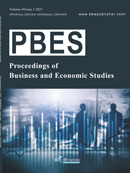Abstract
The efficient market hypothesis is one of the most important theories in finance. According to this hypothesis, in a stock market with sound laws, good functions, high transparencies, and extensive competitions, all valuable information is timely, accurately, and fully reflected in the trend of stock prices including the current and future values of enterprises. Unless there are market manipulations, it would be impossible for investors to gain more above the average profits in the market by analyzing former prices. Since the efficient market hypothesis has been introduced, it has become an interest in the empirical research of the security market. It is one of the most controversial investment theories and there are many evidences supporting and also opposing this hypothesis. Nevertheless, this hypothesis still holds an important status in the basic framework of mainstream theories in modern financial markets. By analyzing simulated investment transactions in regard to stock trading of three different enterprises, this paper verified that the efficient market hypothesis is partially valid.
References
Wang NN, 2011, The capital market efficient market hypothesis and its criticism. Kaoshi Zhoukan, 000(023): 235-237.
Fama EF, 1970, Efficient capital market: a review of theory and empirical work. Journal of Finance, 25: 383 – 417.
Fama EF, 1998, Market efficient, long-term returns, and behavioral finance. Journal of Financial Economics, 49: 283-306.
Su YH, Xing QC, 2007, Behavioral finance theory: reconsideration of the effective market hypothesis. Finance & Economics, :1000-8306.
Ding ZG, Jin B, Xu DC, 2017, The test of efficient market - criticism of EMH theory by behavioral finance. Contemporary Economic Research, :1005-2674.
